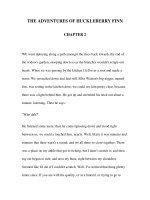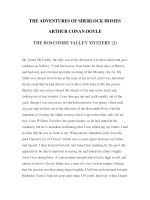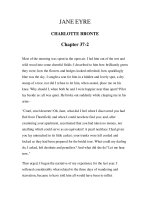PREPOSITION COMBINATION 2 pptx
Bạn đang xem bản rút gọn của tài liệu. Xem và tải ngay bản đầy đủ của tài liệu tại đây (110.05 KB, 6 trang )
PREPOSITIONS
1. PREPOSITIONS OF TIME
A. In
• century ( in the twenty-first century)
• decade ( in the 1970s; in the nineties)
• year (in 2007)
• season ( in the summer)
• month ( in July)
• parts of the day ( in the morning; in the afternoon; in the evening)
• the past/ future
• amounts of time ( in/within an hour)
B. On
• date (on September 11)
• day (on Monday; on Sunday morning)
C. At
• time of day (at 9:20)
• night/ midnight/ noon /dawn/dusk/sunrise/sunset/the moment/the same
time/present/ first/last
D. During
During is used with periods of time
• It snows a lot in Montreal during the winter
• His company grew rapidly during the 1980s
During is NOT used with dates or days of the week.
E. Until
Until is used with points of time to indicate that an action continues up to that point
• Helen practiced the piano until noon
• They won’t arrive until tomorrow
F. From …. To/until and between … and
These phrases are used with starting points and ending points
• From 1990 to/until 1993, Mr. Nolan was in charge of the sales division.
• Between 1990 and 1993, Mr. Nolan was in charge of the sales division.
1
G. Since/ For
Since and for are generally used with a perfect tense
• We've been waiting here since two o'clock.
• The factory has been here since the 1970s.
• We had been talking for a good half hour.
2. PREPOSITIONS OF PLACE
A. In
• the world
• continent (in Asia)
• country ( in China)
• state/province (in California; in Ontario)
• in city ( in Munich)
• building (in the Empire State Building)
• room (in the living room)
B. On
• earth (the origin of life on Earth)
• street ( on Wall Street)
• coast ( on the East Coast)
• floor ( on the second floor)
C. At
• address (at 634 Sutter Street)
• building (at the museum)
• home/school/college/work
D. From … to and between … and
• They're building a new road between Manchester and Sheffield.
• They're building a new road from Manchester to Sheffield.
2
3. OTHER COMMON PREPOSITION COMBINATIONS
A. In
• clothes ( in a gray suit)
• language ( written in Vietnamese)
• book ( in the Complete Guide to TOEIC)
• newspaper ( in the International Herald-Tribune)
• magazine ( in Times)
• department ( in the sales department)
• field ( in computer science)
• one’s opinion (in her opinion)
• a car / a taxi (I've left my bag in the car.)
• trouble (I think I'm in trouble with Dad.)
• danger of (The bridge was in danger of collapsing.)
• part (The failure of the project was due in part to his lack of leadership.
• front of (He walked along in front of me, holding the lantern.)
• the middle of (Jo was standing in the middle of the room.)
• the back of (Two men were sitting in the back of the car.)
• the rear (a passenger traveling in the rear of a car)
• line (The kids were standing in line waiting for their teacher.)
• the process of (The company is in the process of moving to new offices.)
B. On
• a vehicle ( on a bus; on a train; on a plane)
• foot (It takes about 30 minutes on foot, or 10 minutes by car.)
• a trip (We were all going on a trip.)
• business (She's in New York this week on business)
• holiday (I'm away on holiday until the 1st of June.)
• sale (These gloves were on sale for only $9.)
• the market (Handguns are freely available on the open market)
• schedule (The majority of holiday flights depart and arrive on schedule.)
• time (Jack was worried about whether he'd be able to get there on time.)
• (the) television/radio (Later that evening we watched it all on television again.)
• the phone (Bridget's on the phone all day long.)
• a farm (Joe had worked on the farm all his life.)
• the other hand (I'd like to eat out, but on the other hand I want to save money.)
3
• purpose (Fire investigators believe the fire was set on purpose.)
C. BY
By is used before a point of time to indicate the latest time. By, in this case, means
“no later than”.
• I will be home by noon.
By can mean “next to”
• She is standing by her friend.
By is used after passive verbs to identify the agent of the action.
• This report was written by Peter.
By is used with means of transportation and communication
• by car/plane/e-mail
Note: in a/my car; on a plane
Other
• By chance/ hand/ far/check/credit card/ means of
D. With
With is used to express the idea of accompaniment or ownership
• I went to the restaurant with Andrea.
• The man with the briefcase is the vice-president.
With is also used to indicate the tool or instrument used to complete something
• He opened the door with his key.
• He paid for the bill with a credit car
E. Without
Without means “ not having, experiencing or showing something”; “not in the company
of someone” or “not doing the action mentioned”
• They had gone two days without food.
• He found the place without difficulty.
• She spoke without much enthusiasm.
• Don't go without me.
• I don't know what I'd do without you.
• The rest of the group set off without him.
• Don't go out without your coat.
• He left without saying goodbye.
4
• You can't make an omelet without breaking eggs.
• Suddenly and without any warning, the army opened fire.
• He had gone out without his parents' permission.
F. Within
Within can mean “during a particular period of time”
• We should have the test results back within 24 hours.
• He fell sick and died within a matter of weeks.
• Within an hour of our arrival, Caroline was starting to complain.
• Within the space of a year, three of the town's factories have closed down.
Within can mean “less than a certain distance from a particular place”
• The invading troops came within 50 miles of Paris.
• We live within easy reach of (=close to) the shops.
• Adjust the driver's seat so that all the controls are within reach (=close enough to
touch)
Within can also mean “ inside the range or limits of something”
• We have to operate within a very tight budget.
• Private security firms have to work strictly within the law.
• You can go anywhere you want within reason (=within reasonable limits)
• He finds it hard to live within his income.
G. Beyond
Beyond can mean “more or greater than a particular amount, level, or limit”
• More people are choosing to work beyond retirement age.
• Inflation has risen beyond the 5% level.
• Such tasks are far beyond the scope of the average school kid.
• Expensive luxuries that are beyond the reach of ordinary people
Beyond can be used to say that “something is impossible to do”
• Scott's equipment was damaged beyond repair.
• The town centre had changed beyond all recognition.
• Due to circumstances beyond our control the performance has had to be
cancelled.
• Why Joan ever married such an idiot in the first place is beyond me.
5
6









